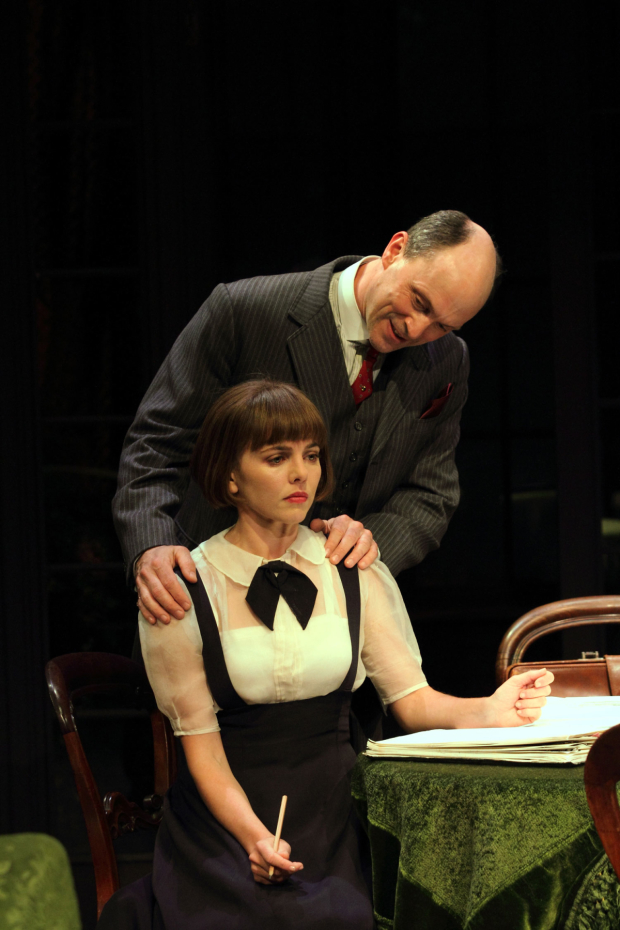Ophelia Lovibond: 'Women’s rights are human rights'
As she opens in a new staging of Githa Sowerby’s powerful play ”The Stepmother”, Ophelia Lovibond explains what drew her to the role

© Dan Wooller for WhatsOnStage
Ophelia Lovibond, who recently appeared in The Libertine at Theatre Royal Haymarket (also known for her role in BBC1's W1A), is currently starring in Githa Sowerby's The Stepmother at the Minerva Theatre in Chichester. Written and set in the mid 1920s, the play sees the titular stepmother and orphan, Lois, caring for the two adolescent children of her husband. What emerges is one of the earliest stage discussions of patriarchy and gender, heightened in a period when women were still in the process of receiving the vote and gaining equal rights.
How did you explore the character of Lois?
A lot of it is there in the writing. Githa Sowerby’s writing is so rich, there’s so much intonation there in terms of the character’s internal monologue and their psychology – considering the play was written in 1924 and Freud was writing from 1912. What she’s talking about is groundbreaking: to rail against the patriarchy. This fleshes out why Lois acts the way she does but also why she swallows a lot of it – why she just accepts and protects her stepchildren, against the malignant influence of their father.
You have to play the same character aged both 19 and 29, how did you approach that?
The ten year age gap is really fun to explore – and how to express that physically, vocally and in terms of posture. You get no peek into that period – you have to think what it would have been like to see her living under the force of her husband. She would have had to harden in a lot of respects. You change a lot in your twenties. The period seems to have been a sink or swim scenario but she decided to swim. She decided which battles to fight and which to let go by.
Why do you think the play is so pertinent?
It’s unfortunate that it’s so pertinent. Women still aren’t paid equally – this play discusses equal pay and it was written 100 years ago. That is very slow going. There has been an improvement in the opening of discussion of the socially constructed gender norms, but with problematic advertising and artificially enforced social divisions it still feels relevant. It’s not about women’s rights, they’re human rights, and they benefit everyone, not just women.

© Catherine Ashmore
How did Richard Eyre the director want to play on it?
He’s been incredibly open – he hasn’t pasted anything on top – it’s all been very organic in the way things have been cultivated. He’s redirected and been very insightful and provided motivations, but he doesn’t block or tell you where to move. It's more of a case of ‘let’s just have a play and see what happens’. It’s very clear that he’s intelligent and insightful. It’s an ineffable quality, to be able to handle with care.
How does the Minerva Theatre's intimacy work with the play?
I think the intimacy will lend itself to the domesticity of the piece. These power struggles in the home are a microcosm of the power struggles happening outside of the home. There isn’t a malevolent force at play, people are just echoing what they hear said. You just need to amplify what’s being heard so you understand the implications. It’s good that it’s shocking.
What do you hope people will take away from it?
I hope the play gets people talking and having conversations. It holds up a mirror. I hope they don’t start texting.
What drew you to the production and role?
Working with Richard. I met him for the role in February and didn’t need to start until July so used that time preparing. But first and foremost the writing – it’s such a strong, muscular role. It’s so exciting to get a female role like this one – I sound like a broken record – there’s real agency here, there’s a lot you can get behind and you have hopes to see it done justice. Reading the play I thought I really wanted to do justice to what she’d wanted to say. People should hear this.
The Stepmother runs at the Chichester Festival Theatre until 9 September.














